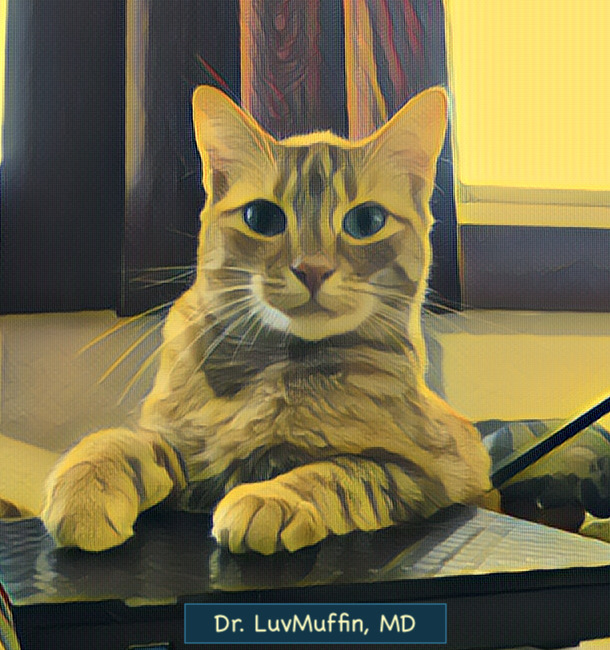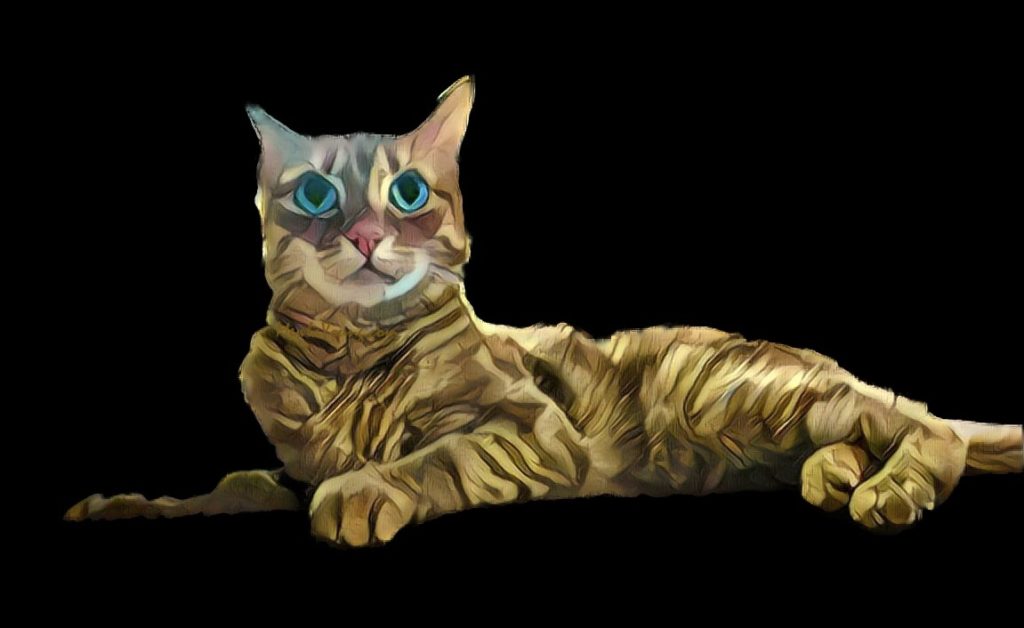Dr. LoveMuffin herself, cat reporter Ginger Grrrl, talks about how cats support the mental health of humans who have suffered from psychological trauma.
Dearest Human,
Beings who have suffered terrible trauma–such as an assault, abuse, disaster, or war—can develop Post Traumatic Stress Disorder (PTSD). This disorder causes people (and cats) to feel constantly on edge, reacting to their world as if danger is imminent.
Not surprisingly, gentle human, those with PTSD often feel irritated, sad, and jumpy. Some people also dissociate, or become disconnected from their thoughts, feelings, or surroundings.[1]
We don’t know how many cats have PTSD, so I’ll just talk about humans who have it. In the US, about one out of ten adults in the general population suffer from PTSD.[2] Some people are more at risk than others, such as combat veterans.[3]
Luckily, dear human, your fur babies are here to help. Cats and other pets make people feel more secure, which helps humans regulate their bodily stress. This means less anxiety and fewer PTSD symptoms.[4] Just petting a soft animal can lower stress and arousal, and stroking or being near pets like me can cause oxytocin (the so-called “love hormone”) to release.[5] No wonder humans who spend time with cats grow to love them (sooner or later)!

The Human-Animal Bond Research Institute (HABRI) is an organization that promotes the important role of the human-animal bond in the health and well-being of people, pets, and communities. On their website, they summarize research studies using Therapy Animals. These are pets who are specially trained to provide animal-assisted therapy to support people who suffer from mental and physical disorders [6]. These research studies showed the ways that animals can help reduce PTSD symptoms.[7]
For example:
- Animal-assisted therapy reduced symptoms of PTSD compared to pre-intervention in five different studies.
- Animal-assisted therapy reduced symptoms of dissociation compared to pre-intervention in two different studies.
- In one study of 80 women, those who watched a video with a dog next to them had less anxiety compared to those who watched the video alone or with a stuffed dog.
- People who had a service dog reported feeling better and having less anger and stress compared to people without a service dog.
- People who had a service dog had lower levels of stress hormones compared to people without a service dog.
Although research has studied dogs more often than cats, I’m here to tell you, gentle human, that cats make great therapy animals. We simply are natural therapists. Just spending time with us pets can help improve stress and other mental symptoms[4].
For people with PTSD, having a feline around is a comforting reminder that danger is no longer present. And don’t forget, we cats purr, which is very soothing. Whether or not someone has PTSD, petting a cat can improve their mood, release “feel good” chemicals, and lower stress.[7]
I’ve said it before and I’ll say it here. In my humble feline opinion, cats can help heal your soul. Hope you’re able to hang out with one today.
Love, Ginger
P. S. To read my article on Animal Assisted Therapy, click here.
Please share comments and questions below! Do you have a suggestion?
Click Contact Us on the menu (top or bottom of page).
REFERENCES
- Wiginton, K. (2023). What Is Dissociation? Downloaded December 31, 2023 from https://www.webmd.com/mental-health/dissociation-overview#1-3
- American Psychiatric Association (2022). Post Traumatic Stress Disorder. In Diagnostic and Statistical Manual of Mental Disorders (5th ed., text rev.).
- Report on VA Facility Specific Operation Enduring Freedom (OEF), Operation Iraqi Freedom (OIF), and Operation New Dawn (OND) Veterans Coded with Potential PTSD.” Office of Public Health. 1 Dec. 2012. Web.
- Baun, M., Johnson, R., & McCabe, B. (2006). “Handbook on animal-assisted therapy: Theoretical foundations and guidelines for practice (Fine, AH Ed.).
- Owens, A. (2021). Tell Me All I Need to Know About Oxytocin. https://www.psycom.net/oxytocin
- L. F.(2016). Does cat attachment have an effect on human health? A comparison between pet owners and volunteers. Behavioral Science, 1, https://doi.org/10.21071/pbs.v0i1.3986. (Or see https://journals.uco.es/index.php/pet/article/view/3986).
- Mental Health Conditions. Downloaded December 28, 2023 from https://habri.org/research/mental-health/conditions/





Helpful article. Thank you!
I don’t have PTSD but it’s good to know that cats and other pets are such a comfort to those who do. Many people could benefit and I’d like to see a wider understanding of the power of pets in our society Thank you for this article..
Great article, Ginger. Animals do heal the soul. Best therapists that I’ve ever had.
I grew up with abuse and didn’t get to adopt a cat until I was 12, when my neighbor moved away and left a kitten. His name is Frankie and that little cat is a blessing in my life. I live on my own now and still have Frankie and he looks after me every day and is there for me when others let me down.
During times of personal distress I can always rely upon my cat to provide constant attention and care for me. He has provided such comfort over the years we’ve been together, especially now. Every day he is by my side, each night he comes to me in my room and snuggles down next to me. I’d rather have him than be alone in a hospice where he would never be allowed.
We are as One, he and I . Never underestimate the strength of the love we have from our cats.
Please